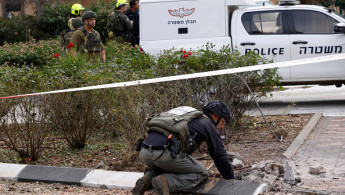One Israeli solider killed, eight wounded by Hezbollah rocket salvo
At least one Israeli soldier was killed, and eight others were wounded by a barrage of rockets shot by Hezbollah at the city of Safad in northern Israel on Wednesday morning in what was one of the largest casualty counts of a single Hezbollah attack publicly acknowledged by Israel since fighting started four months prior.
Israel's northern military command headquarters is located in Safad.
Hezbollah missiles travelled 15 kilometres to strike Safad and other targets in Israel without being intercepted by Israel's Iron Dome missile defence system. Generally, Hezbollah has used low-flying guided anti-tank missiles to avoid the Iron Dome.
Cross-border clashes started between Hezbollah and Israel in the wake of Hamas's 7 October surprise attack on the Gaza envelope and have steadily increased over time.
"As a result of the launches, an IDF soldier was killed and several other IDF soldiers were injured," a statement by the Israeli military said.
Israel added that it had already begun targeting the source of the missile launches in southern Lebanon, and the Israeli war council had reportedly convened to discuss possible responses.
Wednesday's strike follows a series of targeted assassinations of Hezbollah leaders and intense aerial bombardment across the border areas in southern Lebanon.
On Saturday, 10 February, Israel struck the entrance of a mosque as worshipers were leaving afternoon prayers in the Lebanese border town of Houla, killing one and injuring 11 others.
Fighting has killed at least 231 people in Lebanon, most of them Hezbollah fighters, according to an AFP tally. According to Israel, ten soldiers and six civilians have been killed – although Hezbollah claims that figure is much higher.
Hezbollah has said that it would stop fighting on the Lebanese-Israeli border when there is a ceasefire in Gaza.
Israel, in turn, has said it would require Hezbollah to withdraw from the border regions so that the 100,000 or so Israelis displaced from northern Israel would have enough security to return.
Western and regional powers have been engaged in active negotiations to find a solution between the two parties and prevent a full-scale war.
In a speech on 13 January, Hezbollah leader Hassan Nasrallah said that Israel "is not in a position to impose conditions on Lebanon."





 Follow the Middle East's top stories in English at The New Arab on Google News
Follow the Middle East's top stories in English at The New Arab on Google News


